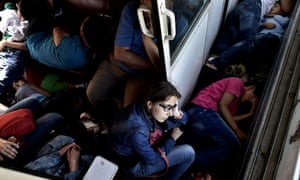
EU interior and justice ministers are to meet in a fortnight in an effort to find concrete measures to cope with the escalating migration crisis.
The ministers will meet on 14 September in Brussels after a statement from the home affairs ministers of Germany, France and Britain said they had “asked the Luxembourg presidency to organise a special meeting of justice and interior ministers within the next two weeks, so as to find concrete steps” to deal with the situation.
The three “underlined the necessity to take immediate action to deal with the challenge from the migrant influx”.
The call came after Germany’s Thomas de Maizière, Britain’s Theresa May and France’s Bernard Cazeneuve spoke about the crisis on the sidelines of a meeting in Paris on Saturday on transport security after passengers thwarted an attack on a high-speed train from Amsterdam to Paris.
In August, May visited Calais to inspect new security measures aimed at preventing migrants from reaching England via the Channel tunnel. Up to 5,000 displaced people are estimated to be in the French port, with at least nine known to have died trying to make the journey into Britain since June.
Unprecedented numbers of migrants are reaching EU borders, surpassing 100,000 in July alone and reaching more than 340,000 this year so far. Italy and Greece are struggling to cope, while Macedonia has declared a state of emergency.
The Italian prime minister, Matteo Renzi, said on Sunday he believed the crisis would push the EU to adopt uniform rules for refugees in place of the current patchwork of laws and approaches. “It will take months, but we will have a single European policy on asylum, not as many policies as there are countries,” he told the Corriere della Sera.
The French, British and German statement specifically called for reception centres to be set up urgently in Italy and Greece to register new arrivals, and for a common EU list of “safe countries of origin” to be established, which would theoretically allow asylum applications to be fast-tracked for specific nationalities.
 Germany, which expects to receive 800,000 asylum seekers this year, has been pushing for such a list, arguing that it would free up resources to help those fleeing war and persecution.
Germany, which expects to receive 800,000 asylum seekers this year, has been pushing for such a list, arguing that it would free up resources to help those fleeing war and persecution.May said in an editorial in the Sunday Times that the migrant crisis had been exacerbated by a broken European migration system, which she said demonstrated the need for a renegotiation of the terms of Britain’s EU membership.
She said countries across Europe were realising that the Schengen agreement – which created Europe’s borderless area – had exacerbated the crisis, which would be a “wake-up call” to European leaders that they needed to consider “the consequences of uncontrolled migration”.
“The events of this summer have shown that the most tragic consequences of a broken European migration system have been borne by those at risk of exploitation,” May wrote. “And the greatest beneficiaries have been the callous gangs who sell false dreams and trade on the free borders within the EU.”
May said suggesting that migration could not be controlled within the EU – which gives freedom of movement to member state nationals – was defeatist and wrong and flew in the face of the evidence.
“Reducing net EU migration need not mean undermining the principle of free movement. When it was first enshrined, free movement meant the freedom to move to a job, not the freedom to cross borders to look for work or claim benefits.”
The shadow home secretary, Yvette Cooper, said May was treating immigration and asylum as the same issue. “We have long called on her to do more to help Syrian refugees, but the government won’t because they are included in the net migration target,” she said. “Increasing the rhetoric doesn’t help anyone, what we need is sensible and practical policies instead.”
She accused May of being dishonest by pretending she still had a migration target of tens of thousands. “The reality is that net migration is over three times the target she set and has risen since she took office – so all she is doing is undermining trust in the whole system,” Cooper said.
Figures from the Office for National Statistics show migration to Britain has hit a record high, reaching 330,000 in the year to March. The rise comes despite a pledge made by David Cameron in 2011 to bring down immigration to the tens of thousands.
May argued that the biggest single factor preventing the government from meeting its immigration target was net migration from the EU. “While net migration from outside the EU is 10% lower than it was in 2010, net migration from within the EU has more than doubled,” May said. “That is why this government’s renegotiation of Britain’s relationship with the EU is so important.”
May argued that only European migrants with a job lined up should be allowed into the UK. “Net migration at that volume is simply unsustainable,” she wrote. “It puts pressure on infrastructure, such as housing and transport, and public services, such as schools and hospitals.”
Four in 10 of the migrants who came to the UK last year came with no job waiting for them, said May, and this “search for a better life” has had huge economic costs for the countries they’ve left behind.
“A third of Portugal’s qualified nurses have migrated; 20% of the Czech Republic’s medical graduates leave as soon as they qualify; nearly 500 doctors are leaving Bulgaria every year.”
Cameron will continue his attempt to renegotiate the terms of the UK’s membership of the EU on Friday, visiting Lisbon for talks with the Portuguese prime minister, Pedro Passos Coelho, before traveling to Madrid where he will meet the Spanish prime minister, Mariano Rajoy.
Downing Street said: “The prime minister has been clear on the four areas where the UK is seeking reform of the European Union. Technical talks on these issues are now under way and while these talks take place he will continue to hold discussions with his counterparts – including in Portugal and Spain this Friday – in order to secure reforms that address the concerns of the British people.”
Δεν υπάρχουν σχόλια:
Δημοσίευση σχολίου